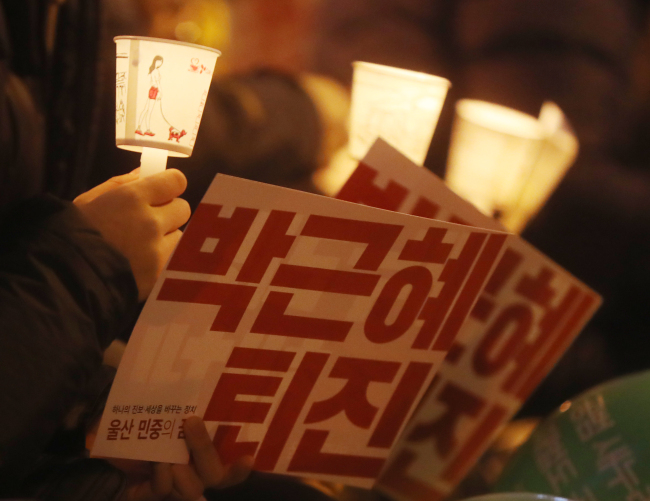Rise of ‘Candle Citizens’ to reshape democracy in 2017
2017-01-04 16:21
South Koreans rewrote the nation’s history of democracy last year by relentlessly taking to the streets for more than two months against scandal-ridden President Park Geun-hye, with the New Year’s Eve protest bringing the cumulative number of protestors to 10 million.It was the “candle citizens” who pushed hesitant lawmakers to impeach Park on Dec. 9, over allegations that she allowed her longtime friend to meddle in state affairs and colluded with her to extort money from local conglomerates.
After that rare, fulfilling experience, many Koreans, and civil society as a whole, seem more determined and eager than ever to correct the country’s flawed systems -- laid bare by Park’s scandal -- and make democracy stronger, society fairer and the government more responsive.
 |
| Protestors hold candles and signs that have slogans calling for the immediate ouster of President Park Geun-hye during a rally in Seoul last year (Yonhap) |
"I've had enough with lawmakers who do not care about citizens. The scandal made me take more interest in politics and (reminded me to) carefully cast my ballot in the upcoming presidential election.”
Organizers of the anti-Park rallies are planning to continue the weekly protests until the sanctioned leader’s removal is confirmed by the Constitutional Court. They are trying to use the momentum from the rallies to create a long-term discussion to map out plans to fix the nation.
They -- over 1,500 civic groups and labor unions -- have formed a Citizens’ Council to make their voices heard in the long-term in the political realm.
"It is a forum to collect a variety of ideas in their neighborhoods, understand clashing viewpoints and come up with solutions for problems facing society,” said Choi Hyun-mo, one of the organizers.
SungKongHoe University professor Kim Seo-joong also sees the rise of a new grassroots movement after the candlelight vigils.
"Social media made it possible for citizens to take to the streets on an unprecedentedly large scale,” said the journalism professor. “Through social media, candles will not be blown out, citizens will continue to criticize politicians and mobilize themselves."
"To complement the representative democracy, however, there should be further talks on how to keep the political system and political elites -- who often attempt to maximize their self-interest -- in check. I think it is possible to bring in ‘candle citizens’ into such a discussion."
However, Lee Nae-young, a politics professor at Korea University, highlighted the limitations of street rallies.
"The long-lasting candlelight vigils have been possible due to a broad agreement to demand President Park’s resignation,” said he. “As the candlelight vigils successfully pushed the parliament to impeach the president now, the rally participants’ demands will begin to further diversify."
Although the main cause behind the rally remained the same -- Park’s immediate ouster -- there have been growing policy-related calls for scrapping the state-authored history books, labor market reform plans and the US’ Terminal High Altitude Area Defense anti-missile system, among others.
Some citizens frowned upon labor unionists’ demand for the release of Han Sang-kyun, chief of the Korean Confederation of Trade Unions, who is standing trial on charges of leading illegal rallies. The demand for a cancellation of the court ruling in December 2014 that dissolved a minor progressive party for the alleged pursuit of North Korean ideology also drew criticism.
"With the growing movement against the impeachment of Park, conflicts in civil society will reach a peak in the run-up to the upcoming presidential election,” Lee said. “It is time for the parliament to take the lead in framing political agendas and reflect the people’s voices in the policymaking process."
 |
| (Yonhap) |
Sociology professor Lee Byung-hoon at Chung-Ang University stressed that past rallies were already a progress for the country’s democracy.
"The past rallies have been led and dominated by specific groups, but this time, the majority of protestors were unaffiliated citizens who voluntarily chose to participate out of anger toward the president,” he said.
"South Koreans have taken to the streets in a peaceful and mature manner, with the festive rallies becoming a platform to express various opinions."
With citizens engaged, politicians attentive and the government more responsive, hopes are high that South Korea may be in for a more resilient and vibrant democracy this year, other experts said.
"I believe that the strong elements of direct democracy we are trying to embrace here will gradually complement the representative political system to achieve a democracy that works for all,” Choi, the rally organizer, said.
By Ock Hyun-ju (laeticia.ock@heraldcorp.com)
